Construction of the new equipment maintenance facility.
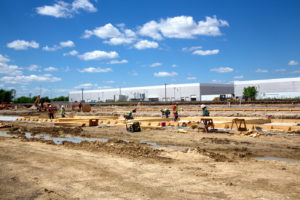
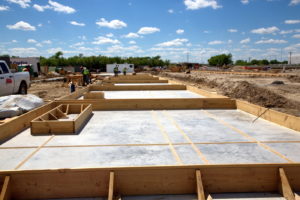
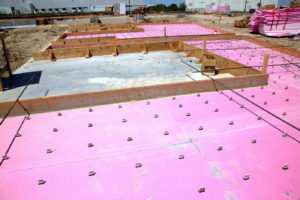
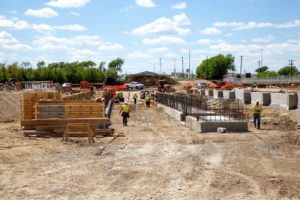
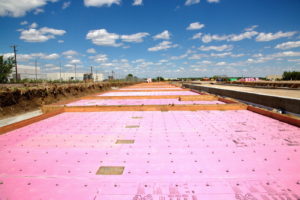
Construction of the new equipment maintenance facility.





The Fort Worth Transportation Authority and the Federal Transit Administration of the United States Department of Transportation signed a $499.39 million Full Funding Grant Agreement today, which completes the local and federal funding for the $1.034 billion commuter rail project.
Slated to open for service in late 2018, TEXRail is a 27-mile commuter rail line that will extend from downtown Fort Worth, across northwest Tarrant County, through North Richland Hills and Grapevine, and into Dallas Fort Worth International Airport’s Terminal B.
“Signing the Full Funding Grant Agreement signifies success for everyone who has worked diligently over the years to make TEXRail a reality,” FWTA President/CEO Paul Ballard said. “I am grateful to the FTA for their support of this project, and especially to FTA Acting Administrator Carolyn Flowers for joining us on this momentous occasion.”
Bob Baulsir, FWTA vice president of rail and procurement, said the TEXRail project is transformative for the region.
“The economic development that we already see in Fort Worth and in the nearby communities of Grapevine and North Richland Hills is pretty amazing,” he said. “Transit-oriented development shows that people want to live close to public transportation. For folks like me, who live downtown and travel a lot out of the airport, they can walk from their homes to the station and be at the airport in less than an hour, and they don’t have to pay to park.”
TEXRail’s route will start at the T&P Station and continue to the Intermodal Transportation Center, North Side, Beach Street/Mercantile, Iron Horse and Smithfield (both in North Richland Hills), Grapevine/Main Street, DFW Airport North and DFW Airport Terminal B.
“A key element of our Transit Master Plan is to serve more people and more places – and TEXRail does just that,” Ballard said. “In addition to current residents along the route, we will have multiple communities of riders in the transit-oriented developments.”
About the TEXRail Train
The FLIRT 3 (Fast Light Innovative Regional Train) vehicles, which are built by Stadler Bussnang AG of Switzerland, will be assembled in Utah as part of the Buy America program. The first car shells will be arriving in the United States later this month, and the first completed train set will be featured at the 2017 American Public Transportation Association (APTA) Expo in Atlanta.
The diesel multiple unit (DMU) trains are configured with an operator cab at either end for bidirectional movement. At the center of the train is a power pack with two diesel engines. This style of train is much quieter than traditional commuter rail. TEXRail amenities include work tables, lap trays, a quiet car, level boarding and overhead storage for bags.
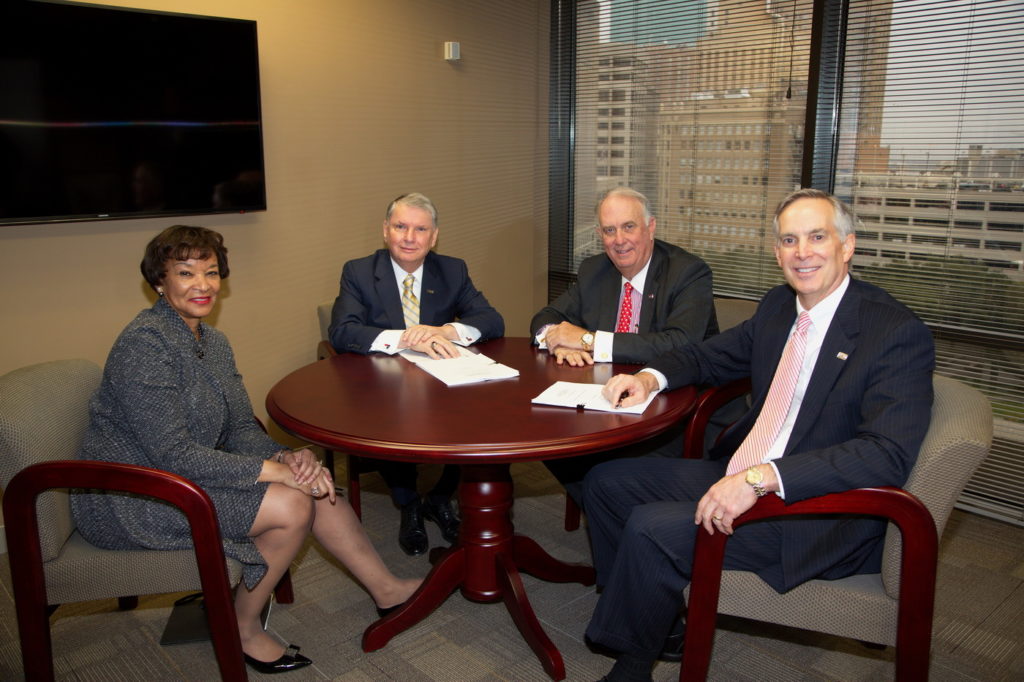
On Nov. 8, 2016, Richland Hills residents voted to discontinue Fort Worth Transportation Authority (FWTA) services. On Nov. 22, 2016, the Richland Hills City Council is expected to certify the results. If that occurs, Wednesday, Nov. 23, 2016, will be the last day for FWTA to provide bus service or MITS paratransit service for persons with disabilities in Richland Hills, per Texas Transportation Code Sec. 452.
Trinity Railway Express services are not impacted by the election and will continue.
The Fort Worth Transportation Authority (FWTA) invites public review and comment regarding proposed bus service improvements affecting Routes 1 (N. Main, A, B, C & D), 11, 12, 14, 15, 17, 46 & 62.
Also being proposed is new service along Beach Street (north of Loop 820) and three new Routes operating primarily along River Oaks, Long Avenue and Angle Avenue (to TCC NW Campus). If approved, changes would be effective April 9, 2017.
Thursday, Dec. 1, 2016 Northside Community Center
6 p.m. 1100 N.W, 18th St., Fort Worth, TX 76164
Tuesday, Dec. 6, 2016 Riverside Community Center
6 p.m. 3700 E. Belknap St., Fort Worth, TX 76111
Monday, Dec. 12, 2016 Diamond Hill/Jarvis Branch Library
6 p.m. 1300 N.E. 35th St., Fort Worth, TX 76106
Thursday, Dec. 15, 2016 Intermodal Transportation Center (ITC)
5:30 p.m. 1001 Jones Street, Fort Worth, TX 76102
Monday, Dec. 19, 2016 The Club at Heritage
6 p.m. 9536 Courtright Dr., Fort Worth, TX 76244
Attending a public meeting or the public hearing is not required for offering input. You may also submit comments in one of three ways by 5 p.m. Friday, Dec. 23:
– Write to FWTA, 801 Cherry Street, Suite 850, Fort Worth, Texas 76102, to the attention of Joanne Heredia.
– Call FWTA’s Comment Line: 817-215-8793.
Repairs to the Trinity Railway bridge near the junction of I-35E southbound and 183 will result in lane reductions on both highways for the following weekends:
· 10 p.m. Oct. 29 to 10 a.m. Oct. 30
· 10 p.m. on November 5 to 10 a.m. on Nov. 6
· 10 p.m. on November 12 to 10 a.m. on Nov. 13
· 10 p.m. on November 19 to 10 a.m. on Nov. 20
· 10 p.m. on December 10 to 10 a.m. on December 11
Prepare for delays if you travel southbound on I-35 and east on 183 during these times beginning on Oct. 29. .
Passengers can soon enjoy more frequent trains and extended hours of service on the Trinity Railway Express (TRE).
The new schedule, which begins Oct. 24, features weekday train service every 30 minutes during peak periods. For evening, midday and Saturday service, the frequency will be every 60 minutes.
Riders will also benefit from greater weekend service, with later service hours on Friday and Saturday. In addition, Saturday service will start three hours earlier.
“These enhancements to TRE service are designed to meet the needs of our customers while giving them more options for maximum convenience,” said Paul Ballard, president/CEO of the Fort Worth Transportation Authority.
“Customers have been asking for these improvements, and we are pleased to put them in place,” DART President/Executive Director Gary Thomas said. “More convenient schedules benefit our current riders and we believe will help us attract new ones.”
To learn more about the new schedule, go to www.trinityrailwayexpress.org.
The Trinity Railway Express is jointly operated by the Fort Worth Transportation Authority and Dallas Area Rapid Transit. The 10-station route runs between Fort Worth’s T&P Station and Dallas Union Station.
[tnc-pdf-viewer-iframe file=”https://ridetrinitymetro.org/wp-content/uploads/2020/01/TEXRailNewsletter_Sept_online_mech.pdf” width=”800″ height=”600″ download=”true” print=”true” fullscreen=”true” share=”true” zoom=”true” open=”true” pagenav=”true” logo=”true” find=”true” current_view=”true” rotate=”true” handtool=”true” doc_prop=”true” toggle_menu=”true” toggle_left=”true” scroll=”true” spread=”true” language=”en-US” page=”” default_zoom=”auto” pagemode=”” iframe_title=”TEXRail September 2016 Newsletter”]
[tnc-pdf-viewer-iframe file=”https://ridetrinitymetro.org/wp-content/uploads/2020/01/DBE_Newsletter_Sept_online_mech.pdf” width=”800″ height=”600″ download=”true” print=”true” fullscreen=”true” share=”true” zoom=”true” open=”true” pagenav=”true” logo=”true” find=”true” current_view=”true” rotate=”true” handtool=”true” doc_prop=”true” toggle_menu=”true” toggle_left=”true” scroll=”true” spread=”true” language=”en-US” page=”” default_zoom=”auto” pagemode=”” iframe_title=”DBE Newsletter September 2016″]
Shawn M. Donaghy, chief operating officer and vice president for the Fort Worth Transportation Authority (FWTA), was chosen from hundreds of nominations for Mass Transit’s 2016 Top 40 under 40. Recipients are chosen for their innovation, leadership and commitment to impactful change in transit.
For Donaghy, working in public transportation is more than a career – it’s a family tradition. Following in his father’s and grandfather’s footsteps, he has worked in the field of transportation for his entire career and has risen through the ranks to his current position at FWTA. Donaghy’s father is the CEO in Dayton, OH, and his grandfather is in the American Public Transportation Association (APTA) Awards Hall of Fame.
At FWTA, Donaghy is responsible for transit operations fixed-route service, paratransit service, fleet maintenance operations, risk and safety, transit security, operations service scheduling, contract services and vanpool, information technology and operational performance metrics. Since joining the leadership team in 2015, he has reorganized the operations and maintenance departments for better efficiency and sustainability, and is overseeing the implementation of major IT infrastructure upgrades. He has put into place significant process improvements and changes to provide world-class service, and he has implemented a continuity of operations plan and additional security protocols.
Donaghy was a member of the Leadership Fort Worth Class of 2015 and his team won 2016 APTA Certificates of Merit for Safety and Security. He is also a member of APTA and the Conference of Minority Transportation Officials.